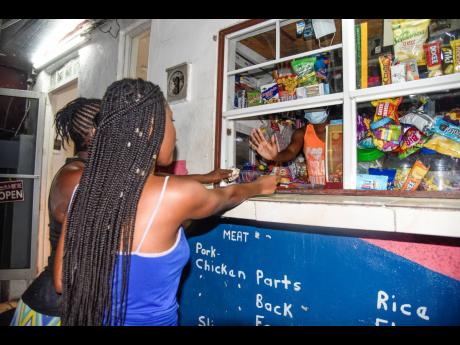Lawrence Nicholson | Corner shops, the unsung heroes of commerce
The national honourees from Heroes Day are still getting used to their medals, many still basking in the glory of their well-deserved awards.
However, each year when Jamaica pauses to recognise a small segment of society, there is the accompanied debate regarding who is deserving and who is not. While the current proposition does not seek to join the ‘debate’, it certainly seeks to place in full view a set of unrecognised heroes – our beloved corner shops, over 90 per cent of which are family-owned businesses, FOBs.
A colleague and I have done some research on corner shops in Jamaica, which, in a few days, will be submitted for publication in a peer reviewed journal. Part of what we discovered fits with the definition of a hero as posited by Christopher Reeve – “A hero is an ordinary individual who finds the strength to persevere and endure in spite of overwhelming obstacles”.
Our findings show that corner shops have demonstrated that they have the strength to persevere and endure even when faced with obstacles more daunting than those encountered by other business entities. However, over many years they have struggled to get their deserved recognition from government and many large private sector entities.
There is no consensus definition of corner shops. One description that fits Jamaica’s context refers to shops located in communities to serve the needs of those who live in and interact with their communities. However, corner shops are usually open and ready to serve all and sundry, those within and outside the community.
In other countries, corner shops are called corner stores and convenience stores, and are usually smaller than supermarkets. Corner shops in communities are usually in clusters and are homogeneous. That is, corner shops are usually located in close proximity, selling similar items. Reasons for starting corner shops include, meeting identified needs of potential patrons, providing employment for the shop owners and their families, providing another stream of income and maintaining family tradition.
Small size, big presence
Corner shops have been described as the “life blood” of many communities in Jamaica. The following comments from various sources capture this sentiment:
“Supermarkets can’t meet my needs because they don’t sell in the portion I can afford”;
“Without corner shops, wi wouda dead [we would have died] during COVID; a corner shops keep the thing going”;
“Corner shops cater to our needs, we can get things to buy any time and any day”; and
“The corner shop is where I can go and hold a meds about life [have a conversation, take a break from the stress of life]”.
In short, corner shops in Jamaica cover different roles; they provide employment, serve as social hubs, as “counselling centres” and the “community parliament”.
While the profit margins from corner shops are small, owners and operators seem to be content in having the security of their own employment, which provides income to send their children to school. Many have expressed the satisfaction of being able to operate a corner shop close to their home, thus providing security for their home while operating a business. This should not be taken for granted in the context of the level of violence in Jamaica.
For the patrons, it is a big deal being able to purchase food and other items at any time and on any day, in the portions they can afford.
“I can’t buy half a bread or small portion of other things at supermarkets; I can get this at my corner shop”;
“I can even trust [obtain goods on credit] when I do not have the money. Supermarkets will not do this”.
Rebrand as hubs
Corner shops should not be treated as an afterthought and just part of the informal economy that get attention only when there is a Crab City-like incident. They should be considered as important hubs for fostering community development, that is, government and private sector entities need to find ways to maximise the economic and social impact of corner shops.
For example, government could benefit from sending out envoys to corner shops to get a true breakdown of the implication of the budget after its tabling in parliament; there might be no harm in hanging out at corner shops before the tabling of the budget.
The security ministry and security forces could find ways to utilise the accessibility of corner shops to address a number of social ills, which if not addressed in a timely manner, can mushroom into full-blown violence.
Among the findings from the research referred to above is that corner shops help to “cool tempers” and “reduce tension” that might have escalated into violence in some communities. There are other findings that are beyond the current discourse and which will have to come after publication of the research.
For how long will Jamaica allow corner shops to remain as unsung heroes? It’s time to give them their due honour. Some might even be willing to say that they are more deserving than many who have been given national honours. The verdict is still out.
More anon!
Lawrence Nicholson, PhD, is a senior lecturer at the Mona School of Business & Management, University of the West Indies, author of Understanding the Caribbean Enterprise: Insights from MSMEs and Family-Owned Businesses and a director of the RJRGLEANER Communications Group.lawrence.n.08@gmail.com


